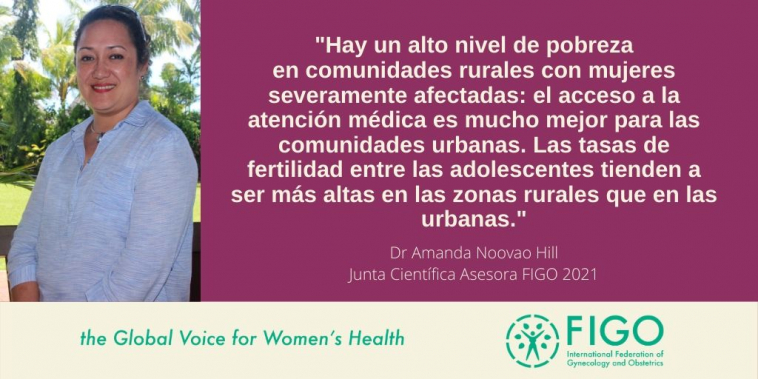Addressing VAWG in Fiji
FIGO speaks with Dr Amanda Noovao Hill, Fiji National University and member of FIGO’s 2021 Scientific Advisory Board, about the issues women face in Fiji, including a high rate of gender-based violence.

‘I am Generation Equality: Realising Women’s Rights’ is UN Women’s theme for this year’s International Women’s Day, marking the 25th anniversary of the Beijing Declaration and Platform for Action.
As the global community takes stock of progress made for women’s rights since the adoption of the Beijing Platform for Action, FIGO speaks with Dr Amanda Noovao Hill, Fiji National University and member of FIGO’s 2021 Scientific Advisory Board, about the issues women face in Fiji, including a high rate of gender-based violence.
“In Fiji women and girls remain trapped in their reproductive biology; high unplanned pregnancy rates, poor contraceptive uptake rates, high sexually transmitted infection rates with subsequent pelvic inflammatory disease, ectopic pregnancies, infertility and high cervical cancer rates.
Gender based violence is common; sadly 64% of women aged 18-49 who had been in an intimate relationship experienced physical and/or sexual violence by a husband or intimate partner. This is almost double the global average. Reports of this violence to police, health and social services is also low due to stigma, fear, shame, lack of access to services, inadequate response from police, and high levels of community tolerance of violence.
Health literacy is also poor, and access to quality care is challenging due to lack of resources, poor policy decisions and funding. Even when the care can be accessed, the women are faced with a lack of respectful client-focused care. But, in order for the care to improve there also needs to be an increase in the capacity to train those in reproductive health.
When it comes to government commitment to change these issues, there is a difference between verbal commitment and action. Fiji has had major challenges politically and socio-economically, which is reflected in the delivery of health care in a resource constrained environment. Government policy lacks clear strategies to deal with this complex situation and often results in crisis management, e.g. there is no clear commitment to cervical cancer screening. Most cases are discovered at a later stage and there are limited gynae-oncology services, as well as no radiotherapy.
However, in 2018 began a national rollout of the Fiji Service Delivery Protocol for Responding to Cases of Gender-Based Violence. The aim of the project is to ensure survivors of gender-based violence across Fiji receive a high quality support service. The protocol ensures the provision of appropriate, timely and quality services for survivors of gender-based violence, and is a binding agreement for frontline service providers committing them to a common set of principles and guidelines.
There is a high poverty level in rural communities with women being severely affected - access to health care is much better for urban communities. Fertility rates amongst teenage girls tend to be higher in rural than urban areas. Delays for women living rurally occur due to socio-economic disempowerment, transport, and the lack of local facilities and expertise.
I have a vision for women to be empowered to enjoy a happy, rewarding life with equal opportunities to live to their full potential free from unplanned pregnancies, STIs and their consequences, cervical cancer and other reproductive health problems. To facilitate this by 2030, we need a reproductive health workforce that is competent, compassionate and ethical.
We as specialists in women’s health have an advocacy role. But we must begin with ourselves by ensuring that we are competent, motivated, compassionate, ethical and sensitive to the individual needs of our women.”
The UNCSW is preparing to hold a procedural meeting on the 9th of March including an adoption of the Draft Political Declaration and action, including a review of the Beijing Declaration, which called for formal and informal public education programmes about sexual health and violence against women should be prioritised to help raise awareness, and to change attitudes and behaviours. Strategic Objective C1 also called on governments to train primary health workers to recognise and care for girls and women of all ages who have experienced any form of violence.